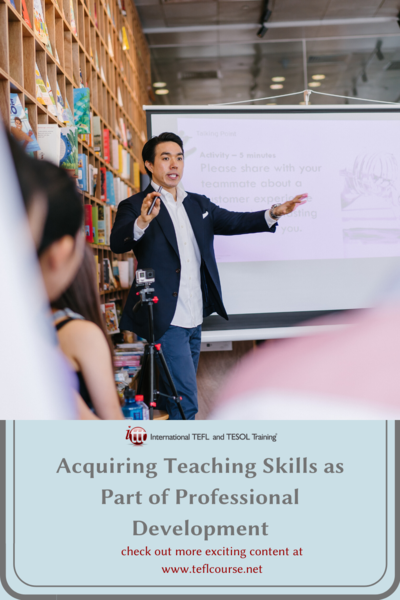Acquiring Teaching Skills as Part of Professional Development

From my teaching experience of teaching English to foreigners of other languages, I had never realized how important it was to learn different teaching methods and skills. I did not major in teaching nor anything related. I majored in Business Administration and simply was allowed to teach ESL in another country where I was not raised, and I did it. Nowadays I compare these skills taught and how different I was teaching back then, that I am so willing to start teaching again, but with these newly acquired skills, I learned. I can remember several experiences in my teaching days that I committed many mistakes that this lesson taught me how to avoid, i.e. how not to talk excessively in class, make a good lesson plan to arrange your time properly, not to point out less advanced students, encourage slower students to participate more, perhaps in groups, etc., etc.
Table of Contents
Do you want to teach English abroad? Take a TEFL course!
This post was written by our TEFL certification graduate Luis B. Please note that this blog post might not necessarily represent the beliefs or opinions of ITTT.
I realized it is very important to learn these teaching skills to move ahead with all of your classes in the best way possible.
Planning is essential in all phases, no matter how beginner your students are. I think you always learn something from your plan and how you apply it to the class. The same students will always give you a way of how to try something different, how to vary your approach from class to class. The same thing will not work for every classroom environment. The engaging (or warm-up like I used to call it until now) is definitely an essential part of the class. I think this is a mistake a lot of teachers make, and just start the class without any type of engaging activity. The engaging part thus helping you to transition to the study section is essential in every lesson plan.

Also read: 6 Steps To Becoming a More Confident Teacher
Having learned the different types of lessons also made me realize just how important it is to learn good teaching skills.
Not just a straight arrow, ESA lesson is important; look at how many different approaches we have in various lessons, i.e. boomerang, straight, etc. Again taking the time to properly allow sufficient room for each phase is imperative. Everyone is used to a simple ESA lesson nowadays, but when you mix it with the other learned factors, it really makes the lesson so different, interesting, fun, and quite easy for the teacher to expose it and teach it. Moving forward, the study phases, having the correct textbooks and workbooks, along with your own worksheets and/or external material, really gives that extra plus in a classroom. There are many ways of doing the study phase while still making it fun inside the classroom. I learned other tactics from this course as well, including pair group activities, games, fill in the gap activities among others. Finally, the engaging part is the most important part I think because it will determine the student's short term progress in the classroom to both the student and teacher. If the student does not continue to practice her/his newly acquired skill, then he/she in time will forget it and no longer be able to progress to other areas. In higher levels I think it is easier to engage, study and activate for the student already has a good base of grammar, vocabulary, etc. It is with these classes that you can actually push them more, bring other activities than the book ones, external materials, etc. as long as the teaching institute allows you to do so.
Do you want to teach English abroad? Take a TEFL course!
I want to close this important task by emphasizing that learning teaching skills is a non-stop task for teachers. One does not continue learning constantly. You can sit in a colleague's class and learn something different than you are used to doing, you may both know the material good enough, but it is just a different approach that sometimes can make the activity flow a whole lot better. The exchange of teaching methods among teachers in an institution is also very important I think due to the constant learning of different skills, and /or methods all of us have. You can also teach other teachers how you do things, and this may also help them exchange methods, ways, in which you do things differently depending on the students in the classroom. Learning teaching skills is a non-stop activity in a teacher's everyday life.
Apply now & get certified to teach english abroad!
Speak with an ITTT advisor today to put together your personal plan for teaching English abroad.
Send us an email or call us toll-free at 1-800-490-0531 to speak with an ITTT advisor today.
Related Articles:
- How Learning A Foreign Language Made Me a Better ESL Teacher
- English as a Non-Phonetic Language
- 5 Activities for Using Movies in the ESL Classroom
- Online or In-Class - Which TEFL Course Should You Take?
- Top 5 Tips: How to Learn a New Language When Teaching English Abroad | ITTT | TEFL Blog
- Getting Student Placement Right - The Best Desk Arrangements for EFL Students




